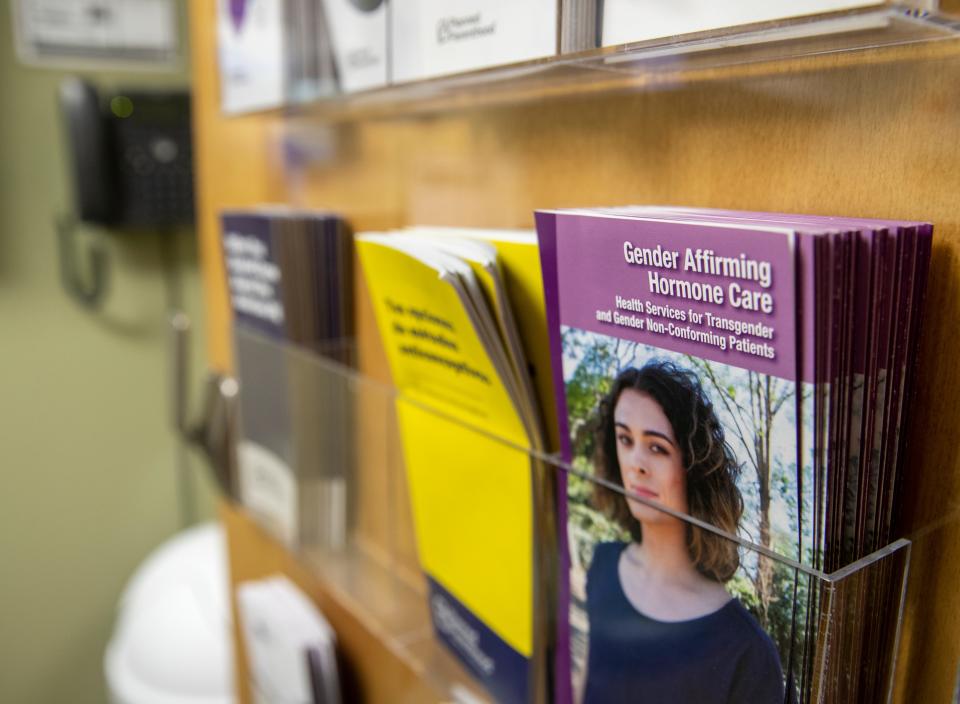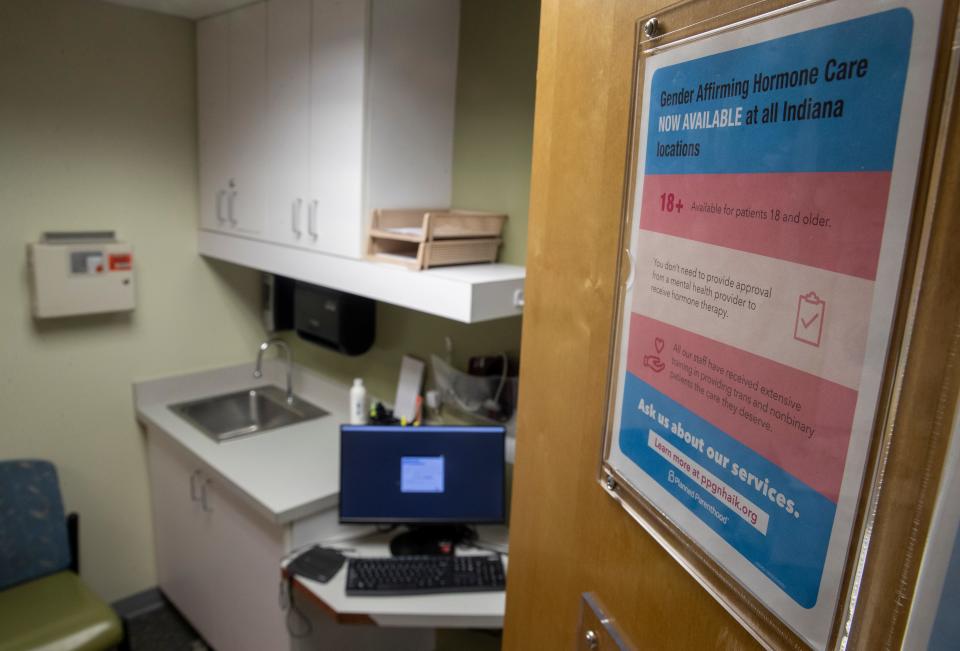'A game changer': Planned Parenthood starts offering gender affirming care
More than a year ago Emma Vosicky moved from Chicagoland to the Indianapolis area to take a job heading up an Indiana agency that serves transgender and non-binary communities and their families. While her physical home is in Indiana, her medical home remains in Illinois.
A trans woman, Vosicky has opted to keep driving more than three hours each way to see her health care providers rather than start what she knows can be a harrowing search to find new doctors in Indianapolis. Trans and non-binary patients often struggle to find medical offices that understand their needs and treat them with respect.
“It’s a complete pain in the neck, but it’s easier for me to travel out of state than it is to get care here,” said Vosicky, executive director of GenderNexus. “There are so few providers who will provide gender affirming care. It is so limited.”
Now, people seeking such care will have more options in Indiana. Planned Parenthood of Great Northwest, Hawaii, Alaska, Indiana, and Kentucky has started offering gender affirming hormone care at all its clinics, including those in Indiana. Unlike other clinics, Planned Parenthood will not require patients to undergo therapy or a mental health professional assessment before providing such care.
Planned Parenthood offers other reproductive health services to this population, such as sexually transmitted infection testing, HIV prevention, and birth control, all through a gender affirming lens.

Aligns with Planned Parenthood values
Such an approach is nothing new for Planned Parenthood. Many clinics in other states have been offering gender affirming care for more than three years now. Recently the affiliate that includes Indiana had all of its clinics' staff undergo the necessary training to begin offering this type of care.
“We see it as aligning with the values of Planned Parenthood as a whole and we see serving transgender and non-binary patients as really important to our goal,” said Finn Kovi, gender affirming care patient navigator, who’s working with staff in the six states.
To ensure all staff have the appropriate background, Planned Parenthood conducts a comprehensive training of at least three hours, putting every staff member through what Kovi characterized as “trans 101.”
The gender affirming training consists of providing an overview and history of the community and touches upon every aspect of a patient’s appointment. It starts with signing in patients and making sure all staff use the correct names and pronouns, Kovi said. Clinicians and others are also taught about the historic trauma that many trans people have experienced.
In many cases the patients will come for care centered around hormone medication regimens. In others they will need sexually transmitted testing or care. But other issues can arise in which the clinicians need to be sensitive, Kovi said. For instance, a person who is not a ciswoman may have a different experience if that person is seeking an abortion or birth control. A ciswoman refers to a person whose sex assigned at birth is female, who still identifies as a woman.
The goal, Kovi said, is to make patients feel respected at every step of the process.
“To my experience, trans and intersex and non-binary people are not used to having a person in their corner…. The trans community is given extra barriers to accessing medical care that cisgender people don’t experience,” Kovi said. “I think it makes a huge difference. It’s really raising consciousness in all of these affiliates.”
Planned Parenthood staff will also help those patients seeking surgery with the often arduous process that entails.
Just a few months after starting to offer these services, the word is slowly getting around, Kovi said. Other Planned Parenthood affiliates that have been offering gender affirming care longer have not had to add staff, but they have seen their patient volume increase.

A big step that will change lives
That’s likely to happen in Indiana as well, say those familiar with the medical needs of the local trans and non-binary community.
As co-director of Riley Hospital for Children’s Gender Health Program, Dr. Eric Meininger follows about 600 patients whom he describes as “gender expansive.” After patients age out of his program – which for some comes as late as age 22 – he has had difficulty finding places to which he can refer them.
Eskenazi Health does have an adult care program that starts at age 16. But Eskenazi does not have the capacity to handle all the patients looking for care, Meininger said. The only other source of care in Indiana is a smaller clinic in the Goshen area.
Some providers say that they’re willing to accept these patients as long as they have someone they can call for back-up if questions arise that they cannot handle, Meininger said. Sometimes, however, it’s not a matter of knowledge but attitude.
“The challenge is not the medicine side of it. The medicine is actually fairly easy,” Meininger said. “The biggest challenge is that the providers don’t understand the community. It’s really a cultural diversity deficiency, just as understanding individuals that are indigenous and people of color is something that white physicians need to learn and become more culturally competent.”
Having the Planned Parenthood clinics providing gender affirming care, therefore, will fill a much needed gap, he said.
People who are unable to access the care that they need experience emotional distress, said Kit Malone, advocacy strategist at the ACLU of Indiana, which works to advance the rights of LGBTQ people around the state. Not only will this impact their access to quality reproductive health care, it may also improve the type of care primary providers and hospitals offer to these patients.
Many have already faced other obstacles associated with being trans that can include poverty and discrimination and lead to severe emotional distress, she said. While Planned Parenthood will ease the difficulties of finding care, people who are trans and non-binary have other challenges as well.
“It’s a big step and it’s going to change lives, but it won’t solve problems…such as poverty, lack of support at home, lack of support from employers, and pervasive discrimination,” Malone said.
One question though that Vosicky and her colleagues at GenderNexus, a social service agency for trans and non-binary people and their loved ones, frequently hear from the people they serve is where to find affirming care.
While there are some affirming providers in the Indianapolis area, those who live in other parts have far fewer options, Vosicky said. Even people who live in Indianapolis may find themselves facing long waits to seek care.
Overseeing a patient’s hormone regimen is not necessarily complex medical care, Vosicky said, but some practitioners, wary of having trans and non-binary patients, may just say that they don’t know how to provide such care.
“There are so few providers that those limited ones who do provide care for the most part are developing huge back lists. They’re trying to provide care for a community who has nowhere else to go,” she said. “Knowing that Planned Parenthood has a presence throughout the state, that’s a game changer.”
Contact IndyStar reporter Shari Rudavsky at shari.rudavsky@indystar.com. Follow her on Facebook and on Twitter: @srudavsky.
This article originally appeared on Indianapolis Star: Gender affirming hormone care now at Indiana Planned Parenthood sites

